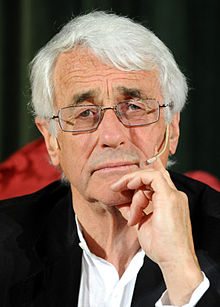Colin Crouch | |
|---|---|
 Colin Crouch in 2013 | |
| Born | 1 March 1944 Isleworth, England |
| Nationality | English |
| Occupation | |
Colin John Crouch, FBA (born 1 March 1944) is an English sociologist and political scientist. He coined the post-democracy concept in 2000 in his book Coping with Post-Democracy. Colin Crouch is currently Emeritus Professor at the University of Warwick and an External Scientific Member of the Max Planck Institute for the Study of Societies.
Crouch was born in Isleworth on 1 March 1944.[1] He gained his BA at the LSE and his doctorate at Nuffield College, Oxford. In 1969, Crouch started as a lecturer in sociology at the London School of Economics.[2] From 1972 to 1973 he was a Lecturer at the University of Bath and was Chair of the Young Fabians. From 1973 to 1985 he was Lecturer and Reader in Sociology at the London School of Economics and Political Science. Then, from 1985 to 1994 he was a Fellow of Trinity College, Oxford, and Professor of Sociology at the University of Oxford.[3] From 1995 to 2000 he was curator of their Bodleian Library.[2] From 1995 to 2004 he was Professor of Sociology and chaired the department of Political Science at the European University Institute of Florence.[2] From 2005 until 2011 he was Professor of Governance and Public Management at Warwick Business School.[2] In 2005, he was elected fellow of the British Academy.[4] Since 2011 he has been Emeritus Professor at the International Centre for Governance and Public Management, Warwick Business School, University of Warwick. He is also an External Scientific Member of the Max Planck Institute for the Study of Societies in Cologne.[3][5]
Crouch coined the term post-democracy in 2000 in his book Coping with Post-Democracy. It designates states that are conducted by fully operating democratic systems (elections are being held, governments fall and there is freedom of speech), but whose application is progressively limited. A small elite is making the tough decisions and co-opts the democratic institutions. Crouch developed the idea in an article called Is there a liberalism beyond social democracy?[6] for the think tank Policy Network and in his subsequent book The Strange Non-Death of Neo-Liberalism. The term appeared to define a running evolution within democracies during the 21st century and is polemical because it calls attention to recognized democracies losing some of their foundations and evolving towards an aristocratic regime.[citation needed]